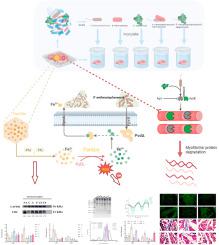Food Microbiology ( IF 5.3 ) Pub Date : 2024-01-11 , DOI: 10.1016/j.fm.2024.104466 Wendi Zhang , Yongsheng Ni , Yunhao Ma , Yong Xie , Xiao min Li , Lijun Tan , Jinsong Zhao , Cong Li , Baocai Xu

|
In this study, we evaluated the histomorphology, reactive oxygen species (ROS), protein degradation, and iron metabolism characteristics and differential expression analysis of genes for siderophores synthesis and protease secretion in prepared beef steaks inoculated alone or co-inoculated with P. weihenstephanensis, B. thermotrichothrix and M. caseolyticus at 4 °C for 12 days. The results showed that the P. weihenstephanensis was the key bacteria that degraded protein in the process of prepared beef steaks spoilage, which led to protein oxidation by promoting ferritin degradation to release free iron and inducing ROS accumulation. The highest expression of FpvA and AprE was detected in the P. weihenstephanensis group by comparing qRT-PCR of the different inoculation groups. Both qRT-PCR and Western blot revealed that ferritin heavy polypeptide and ferritin light chain polypeptide gene and protein expressions were significantly higher in the P. weihenstephanensis inoculation group compared to the other inoculation groups. Results suggested that FpvA and AprE might play roles in meat spoilage and were potential positional, physiological and functional candidate genes for improving the quality traits of prepared beef steaks. This work may provide insights on controlling food quality and safety by intervening in spoilage pathways targeting iron carrier biosynthesis or protease secretion genes.
中文翻译:

魏氏假单胞菌通过铁代谢途径促进预制牛排冷藏过程中的原位腐败能力
在本研究中,我们评估了单独接种或联合接种P. weihenstephanensis的准备牛排的组织形态、活性氧(ROS)、蛋白质降解和铁代谢特征以及铁载体合成和蛋白酶分泌基因的差异表达分析, B. 热丝菌和M. caseolyticus在 4 °C 下保存 12 天。结果表明, P. weihenstephanensis是制备牛排腐败过程中蛋白质降解的关键细菌,它通过促进铁蛋白降解释放游离铁并诱导ROS积累而导致蛋白质氧化。通过比较不同接种组的qRT-PCR,检测到FpvA和AprE的表达量在P. weihenstephanensis组中最高。qRT-PCR和Western blot均显示,与其他接种组相比,魏氏原虫接种组铁蛋白重链多肽和铁蛋白轻链多肽基因和蛋白表达量显着升高。结果表明,FpvA和AprE可能在肉腐败过程中发挥作用,是改善熟牛排品质性状的潜在位置、生理和功能候选基因。这项工作可能为通过干预针对铁载体生物合成或蛋白酶分泌基因的腐败途径来控制食品质量和安全提供见解。



























 京公网安备 11010802027423号
京公网安备 11010802027423号